

 Vol. 40 (Number 44) Year 2019. Page 17
Vol. 40 (Number 44) Year 2019. Page 17
ISMAILOVA, Gulnara Muratovna 1; MENLIBEKOVA, Gulbakhyt Zholdasbekovna 2; BERIKKHANOVA, Gulsara Yezhenhanovna 3; KULMYSHEVA, Nazym Armysovna 4 & ZHAKIYANOVA, Zhanna Gazhkenovna 5
Received: 03/07/2019 • Approved: xx/12/2019 • Published 28/12/19
ABSTRACT: This article considers the problem of the professional competence of modern pedagogical staff. Particular attention is paid to the formation of competences in future teachers-psychologists. The problem of training a competent teacher-psychologist is relevant in the context of modern society. The success of the activity of a teacher-psychologist depends, first of all, on the high level of development of his or her personality and the ability to empathize with others through productive behavior in difficult situations. The article shows that in order to increase the effectiveness of professional training of future teachers-psychologists, it is necessary to form their competence. A teacher-psychologist will have these significant qualities if his or her competence is formed. The most important conditions that contribute to the formation of competence in the context of an educational institution are its transformation into an open social and pedagogical system, a high professional level of teachers, and a favorable psychological environment. An educational institution should create such a social environment that fosters the development of tolerant forms of interaction, readiness to understand the interlocutor and the ability to meet him or her halfway in future teachers-psychologists. |
RESUMEN: Este artículo considera el problema de la competencia profesional del personal pedagógico moderno. Se presta especial atención a la formación de competencias en futuros profesores-psicólogos. El problema de la formación de un maestro psicólogo competente es relevante en el contexto de la sociedad moderna. El éxito de la actividad de un maestro psicólogo depende, en primer lugar, del alto nivel de desarrollo de su personalidad y de la capacidad de empatizar con los demás a través de un comportamiento productivo en situaciones difíciles. El artículo muestra que para aumentar la efectividad de la formación profesional de futuros docentes-psicólogos, es necesario formar su competencia. Un maestro-psicólogo tendrá estas cualidades significativas si se forma su competencia. Las condiciones más importantes que contribuyen a la formación de competencias en el contexto de una institución educativa son su transformación en un sistema social y pedagógico abierto, un alto nivel profesional de docentes y un entorno psicológico favorable. Una institución educativa debe crear un entorno social que fomente el desarrollo de formas tolerantes de interacción, la disposición para comprender al interlocutor y la capacidad de conocerlo a mitad de camino en futuros maestros-psicólogos. |
In the last decade, particular attention has been paid to the competence-based approach in education. While the traditional "qualification" of a specialist means a functional correspondence between the requirements of the workplace and the aims of education, and the preparation is reduced to the mastering of a more or less standard set of knowledge, skills, and abilities, "competence" implies the development of the ability to navigate in the diversity of complex and unpredictable occupational situations, have an idea of the consequences, and bear responsibility for them. The competence-based approach has a humanitarian nature, since it is directly related to the idea of comprehensive training and upbringing of the individual not only as a specialist, but also as a person (Kylyshbayeva, 2007).
The goal of liberal arts education is not only to transfer a set of knowledge, skills and abilities in a certain sphere to the student, but also to develop his outlook, interdisciplinary instinct, ability to individual creative solutions and self-education, as well as humanistic values, which is the basis of professional position.
Among the numerous problems of professional training in the field of psychology, two interconnected aspects can be distinguished, which largely determine the further viability and competitiveness of the specialty (Aymaganbetova, Sagynayeva, 2014; Korolenko et al., 2000).
The first aspect is to a large extent related to the success and effectiveness of the assimilation of psychological disciplines and the formation of a scientific psychological position of a specialist that meets modern requirements. In this case, there arises the problem of pre-selection of persons who are not only willing to devote themselves to the study of psychology, but also suitable for work in the field of "man-man."
The second aspect concerns the formation of the personality, as well as the moral and spiritual appearance of the psychologist. The degree of acceptance and the depth of understanding of ethical norms and principles become dominant. This is primarily due to the uniqueness of the object of psychological impact and the specificity of technological methods that allow deep penetration into the inner world of man. The psychologist, like no one else, gets close to the unique psychic organization and the integral manifestations of the psychology of man. A voluntary or involuntary touch to the soul of the person applying for help should be as cautious as possible and should not prevent from finding oneself or creating a unique life path. The pronounced orientation in professional activity to the value of another person exacerbates the psychologist’s perception of himself, his capabilities and personal problems as a measure of the psychological influence on those around him, based on experiencing a sense of professional duty and responsibility for his professional actions (Madaliyeva, 2013).
When preparing practical professional psychologists, ignoring ethical issues can negatively affect the mental comfort of clients, and become a source of irreparable mental trauma.
The orientation to ethical principles helps the psychologist to determine his own professional and personal position directly in psychodiagnostic activity, research and theoretical studies, to realize the measure of responsibility for the results of his work not only to the client, but also to himself, and most importantly to realize the limits of his own capabilities. Ethical principles create the basis for providing trust to the psychologist on the part of the client, without which psychological diagnosis, forecasting or psychological help are impossible. At the same time, it is important to note the difficulties in the formation of ethical requirements at the present stage of the country's social development. The change in the ideals of personal and professional self-determination, the social defamation of many heroes of the past and the lack of an adequate replacement in the present require certain amendments to the assessment of the ethical aspect of the work of psychologists. The observance of ethical norms reflects the civil and professional position of the psychologist.
Becoming a professional is not a monotonous process; it is characterized by unevenness and heterochronicity. Depending on the stage of professional development, we can single out three types of crises: 1) crises of search and choice of profession; 2) crises of professional training, and 3) crises of independent professional activity. Yu. P. Povarenkov singles out two crises of professional development of students studying pedagogy. The first crisis (the second course crisis) arises as a result of students' awareness and acceptance of a new situation of social-professional development, different from the one in high school. The main result of overcoming this crisis is the formation of the academic form of educational activity and the personality of the student. The second crisis occurs when students face real professional challenges. The crisis begins with the realization that fundamental training during the first three courses is a necessary, but not sufficient condition for solving the problems arising in practice. As a result of overcoming this crisis, the psychological system of professional activity begins to be formed, as well as the foundations for professional intellect, professional identity and the system of professional motivation are laid.
U.S. Rodygina (2007) characterizes the development of the parameters of the professional identity of the first- and fourth-year students majoring in psychology. The data obtained show relative well-being and stability. The first course differs from others because there are no students with the professional identity of a psychologist. Most likely, the identity with the future profession of a psychologist is quite formal: "Since I am studying at the psychology department, I will definitely become a psychologist". The second course is characterized by an increased level of reflexivity. Perhaps this is due to the choice of specialization and the need to think about it. The third course differs in the increased motivation for professional training. The fourth course is characterized by average indices for all the parameters studied. For the first time, one of the leading positions is taken by the value-goal "the financially secure life".
Analyzing the professional position of students-psychologists, it is considered their motivation of professional choice, professional plans, attitude to the content of professional education, as well as participation in research activities. The research data indicate the professional grounds for choosing the future profession, dominated by "interest in the profession" and "desire to help people", which characterizes the value humanistic setting of the professional activity of a psychologist.
Based on the research, one can single out the main psychological features of the formation of the professional position of students studying pedagogy and psychology:
- the activity nature of development (professional position develops as a result of educational and professional activity, and promotes the active mastering of knowledge, skills and abilities for further professional activity);
- the uneven nature of development (latent and crisis periods are observed in the development of the professional position of students; stages can be distinguished by evolutionary and revolutionary trends);
- the probabilistic nature of development (under equal conditions created by the university, different types of professional positions are formed among students; some students plan to work in their specialty after their graduation, others prefer other professions that are not related to the specialty received at the university);
- the individual nature of development (professional position is determined by personal characteristics, including their conformity to professional requirements and motivation of educational and professional activity.
The foundations for studying professional competence were laid by such psychologists as E. Erickson (Erickson, 1995), D. Super (Kondakov, 2009), A. Bandura (Bandura, 2006), etc. The most significant works in this field are by E.P. Ermolayeva (Ermolayeva, 2001), L.B. Schneider (Schneider, 2001), N.L. Ivanova (Ivanova, 2005), K.A. Abulkhanova-Slavskaya (Abulkhanova-Slavskaya, 1998) etc., who demonstrated that competences are realized and developed in the professional sphere.
Various problems of personal competence and the formation of students’ professional competences in the process of studying at the university were investigated by such Kazakh scholars as A.K. Mynbayeva (Mynbayeva and Sadvakasova, 2015), K.Zh. Kozhakhmetova, Sh.T. Taubayeva (Taubayeva et al., 2013), G.A. Beysenova (Beysenova, 2008), Z.B. Madaliyeva (Madaliyeva, 2013), and R.K. Kadyrzhanov (Kadyrzhanov, 2019).
In our opinion, it is necessary to pay special attention to the formation and development of professional competences during the training of students at the university, when the norms and requirements for young people of the chosen specialty are internalized (Erickson, 1995).
When selecting the diagnostic tools, the most appropriate in the framework of this research were the following methods:
- "Who am I?" test by M. Kuhn and T. McPartland (Rumyantseva, 2006);
- Questionnaire of the professional competence of students majoring in psychology by U.S. Rodygina (Rodygina, 2007).
The diagnostic stage of this experiment was carried out through the testing of students of Department of Pedagogy and Psychology, Faculty of Humanities of Kazakh Humanitarian Law Innovative University, and Department of Psychology, Faculty of History and Education of Shakarim State University of Semey. 51 first- and fourth-year students participated in the survey, including:
a) 17 students of Shakarim State University of Semey, which is 33.33% of the total number of students interviewed;
b) 21 students of Kazakh Humanitarian Law Innovative University – 41.18%;
c) 13 students of Kazakhstan Innovative University – 25.49%.
6 respondents are the first-year students, 18 respondents are the second-year students, 20 respondents are the third-year students and 8 students are the fourth-year students. The distribution of the respondents by course in percentage terms is shown in Figure 1.
Figure 1
Distribution of the respondents by course
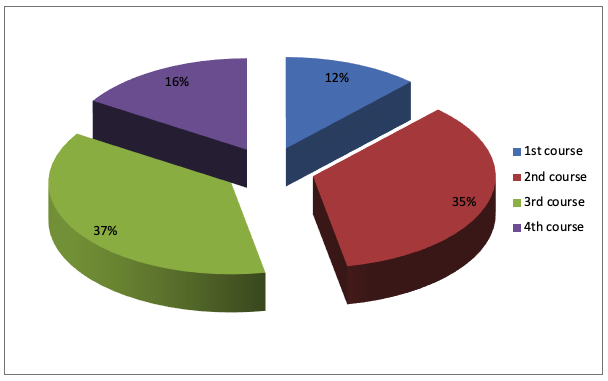
The respondents were asked to sincerely answer the question “Who am I?” in twenty columns of the test form.
The test has nine interpretative indicators: "the social self", "the communicative self," “the material self”, "the physical self," “the active self”, "the promising self," “the reflexive self”, the problem competence, the situational state. To carry out this study, there is a need for the analysis of test results for the indicator "the social self", which includes the following indicators (Fetiskin et al., 2002):
1) gender;
2) educational and professional role position;
3) family affiliation;
4) ethnic and regional competence;
5) worldview competence;
6) group affiliation.
Accordingly, we will be interested in the frequency of statements related to the educational and professional competence of the individual: "teacher-psychologist", "future specialist", "student", etc. Since the number of manifestations of a particular indicator that could be ranked according to the degree of manifestation of one or another type of competence is not determined, we will use only the comparative aspect of manifestation of professional competence, with respect to the other types (Abdrakhmanova, 2005).
When calculating the results, it was revealed that the most dominant in all courses are the indicators "gender", "family affiliation" and "educational and professional role position". From the position of this research, we are mainly interested in the indicator "educational and professional role position" (Abisheva and Adilzhanova, 2013).
For convenience of analysis, we will determine that the result up to 33% will be defined as a weak manifestation of the indicator; from 33% to 66% - an average degree of manifestation; and from 66% – a high degree of manifestation.
The first-year students had a weak manifestation of this indicator (100%). The second-year students in 72.2% had a weak manifestation of this indicator, in 22.2% - an average degree, and in 5.5% - a high degree. Among the third-year students, 68.42% of the respondents showed a low degree of the indicator "educational and professional role position", and 31.58% - an average degree. Finally, the fourth-year students equally showed an average and low degree of manifestation of this indicator (50% each). These results are reflected in Figure 2.
Figure 2
The degree of manifestation of the indicator "educational and professional role
position" based on the "Who am I?" test from the first to the fourth course
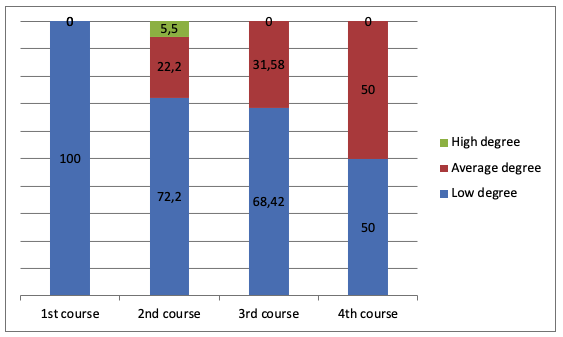
Thus, we can observe how this indicator varies in all years of study. In the first course, this position is inferior to the characteristics related to family affiliation (daughter, aunt, granddaughter, etc.) and the indicator of gender designation ("girl", "lady", etc.). Starting from the second course, the importance of personal belonging to the educational and professional spheres begins to grow significantly, up to the graduating course, where already half of the students are characterized by an average degree of this indicator.
When analyzing the manifestation of the indicator "educational and professional role position" among all the respondents, the following results were obtained:
1) 35 students (68.62%) have a low degree of manifestation of this indicator;
2) 15 students (29.41%) - an average degree;
3) 1 student (1.96%) - a high degree.
The generalized results for this indicator with rounded numerical values are reflected in Figure 3.
It should also be noted that all the respondents indicated certain characteristics related to this indicator ("teacher-psychologist", "student", "future specialist", etc.). This means that each student takes educational and professional roles to some extent, and adequately perceives the actual situation of his development, which is a favorable factor for the development of professional competences.
Figure 3
The degree of manifestation of the indicator "educational and
professional role position" based on the "Who am I?" test
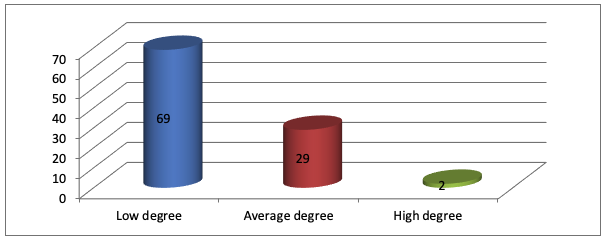
The following diagnostic methodology used in this study is a questionnaire of the professional competence of students majoring in psychology by U.S. Rodygina (Rodygina, 2007).
This questionnaire is designed to identify the level of the professional competence of students majoring in psychology. The methodology consists of 21 statements, with a scale from 1 to 5 points, where "1" is complete disagreement, and "5" – full agreement.
The questionnaire is processed on 4 scales:
1) Positive emotions associated with a certain degree of satisfaction of needs in the profession of a psychologist;
2) Negative emotions associated with the dissatisfaction of these needs;
3) The position of an active attitude towards this profession;
4) The position of a passive attitude towards this profession.
The indicators of the first and second scale determine the level of emotional relationship, where positive or negative emotions can predominate, or there is no obvious predominance.
The third and fourth scales reveal the level of the student's conscious activity. Possible levels are low, average and high.
The totality of these indicators forms nine types of students’ professional competence:
1) the first type – a combination of a passive position and negative emotions relative to the future specialty. Students are disappointed and passive in their studies; they think that they will not be able to realize their chosen profession;
2) the second type – a combination of a passive position and a neutral attitude to the specialty. Students consider university education sufficient for further life, but do not have definite plans for career growth;
3) the third type – a combination of a passive position and positive emotions. These are students-dreamers. They want to engage in the chosen field of activity, devote their lives to psychology, but they do nothing to implement this goal, and have a passive attitude to their studies;
4) the fourth type – a combination of an average active position and negative emotions relative to the profession. Such students are not completely satisfied with this specialty, but they have an adequate attitude to their studies, depending on the situation;
5) the fifth type – a combination of an average active position and neutral emotions relative to the profession. There are no pronounced tendencies, and the attitude to the profession and studies is situational. Under certain environmental circumstances, they can switch to a different type;
6) the sixth type – the ratio of average activity and positive emotions. These are active students, who have a positive attitude to the profession and studies, and are ready to devote themselves to it;
7) the seventh type – a combination of an active position and negative emotions. Students are active in obtaining specialization, but, at the same time, dissatisfied with the chosen profession. Probably, there are external incentives to control their activity (parents, obligations to someone, etc.);
8) the eighth type – a combination of an active position and neutral emotions. Future psychologists with this type of competence have varying emotions relative to the profession depending on the situation, but they take a subjective position to increase their own knowledge, skills and abilities, and try to achieve the intended professional goals;
9) the ninth type – the ratio of activity and positive emotions. Professional competence is clearly manifested. Such students want to work in this area and make certain efforts to achieve this goal.
The respondents of the first year of study have the sixth type of professional competence in 100% of cases (average activity and positive emotions). Freshmen are quite positive about the chosen specialty, but they do not yet show a high level of activity, because they are not able to orientate in the profession due to the lack of knowledge.
Among the second-year students:
1) 4 students (22.22%) belong to the first type of professional competence;
2) 2 students (11.11%) belong to the third type of professional competence;
3) 7 students (38.88%) belong to the sixth type of professional competence;
4) 5 students (27.77%) belong to the ninth type of professional competence.
It should be noted that the second-year students are more likely than the first-year students to have a positive attitude to the specialty and activity relative to the chosen profession.
Among the third-year students:
1) 7 students (36.84%) belong to the first type of professional competence;
2) 2 students (10.53%) belong to the third type of professional competence;
3) 3 students (15.79%) belong to the fourth type of professional competence;
4) 7 students (36.84%) belong to the sixth type of professional competence.
Following the results of research of the third-year students, one can observe that they tend to have the crisis of competence, manifested in passivity, negative emotions and some degree of disappointment in the profession.
Among the fourth-year students:
1) 1 student (12.5%) belongs to the fifth type of professional competence;
2) 3 students (37.5%) belong to the sixth type of professional competence;
3) 1 student (12.5%) belongs to the eighth type of professional competence;
4) 3 students (37.5%) belong to the ninth type of professional competence.
As can be seen from these results, the level of professional competence in the fourth year of study is much higher than in the third. Here, neutral and positive emotions, as well as average or pronounced activity relative to the future profession predominate.
These results in a comparative aspect are reflected in Figure 4.
Figure 4
Results on U.S. Rodygina’s questionnaire of the professional competence of
students majoring in psychology: a comparative aspect (1st-4th courses)
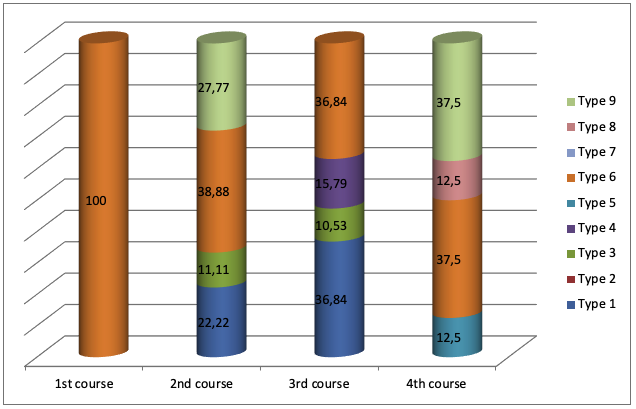
Based on the results of this methodology, the types of professional competence were distributed as follows:
1) 11 respondents (21.57%) - the first type of professional competence;
2) 4 respondents (7.84%) - the third type of professional competence;
3) 3 respondents (5.88%) - the fourth type of professional competence;
4) 1 respondent (1.96%) - the fifth type of professional competence;
5) 23 respondents (45.09%) - the sixth type of professional competence;
6) 7 respondents (13.72%) - the eighth type of professional competence.
7) 8 respondents (15.86%) are the ninth type of professional competence.
These results are shown in Figure 5.
Figure 5
Results on U.S. Rodygina’s questionnaire of the professional
competence of students majoring in psychology: generalized data
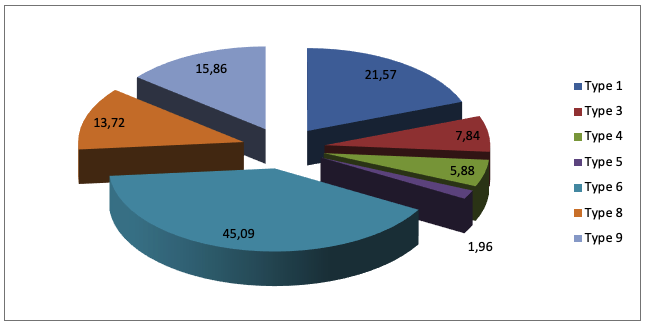
The professional position of students studying at different courses is formed at different levels. The first-year students are mainly positive about the chosen specialty, but are not yet able to navigate in this area in order to fully implement the intended plans and goals. In the second year of study, a more holistic perception of the future profession is formed and, consequently, professional competence is at a higher level.
The fourth-year students have the highest level of professional competence. In the third year, on the contrary, there is a crisis of competence, and the results of its level of development, for the majority of indicators, begin to decrease significantly.
The results of this experimental work prove the need for the development of the professional competence of the third-year students as future teachers-psychologists, since it is during this period of study that students often begin to doubt the chosen specialty, are disappointed in it and acquire attitudes that negatively affect their educational and future professional activities. In this connection, within the framework of this research, a methodology for developing the professional competence of future teachers-psychologists was elaborated and tested, which is aimed at raising indicators such as the educational and professional role position, managing one’s own emotional states, as well as forming a positive emotional attitude and an active position relative to the future professional activity.
ABDRAKHMANOVA, R.B. (2005). Formation of the professional orientation of teachers and psychologists. Doctoral dissertation. Almaty: Abay KazNPU.
ABISHEVA, Sh.Sh., ADILZHANOVA, K.S. Peculiarities of personality self-development in the student age. Proceedings of the International Scientific and Practical Conference "Psychology in Kazakhstan: Past, Present, Future", 2 (4), 236-240.
ABULKHANOVA-SLAVSKAYA, K.A. (1998). Strategy of life. Moscow: Iris Press.
AYMAGANBETOVA, O.Kh., SAGYNAYEVA, T.Zh. (2014). An empirical study of professional competence as a determinant defining readiness for the professional activity of future psychologists. Bulletin of Abay KazNPU. Series "Psychology", 2, 29-35.
BANDURA, A. (2006). Social learning. Moscow: Eksmo.
BEYSENOVA, G.A. (2008). Education and competence. Eurasia, 3, 29-38.
ERICKSON, E. (1995). Life cycle: Epigenesis of competence. Archetype, 1, 40-53.
ERMOLAYEVA, E.P. (2001). Professional competence and marginalism: Concept and reality. Journal of Psychology, 22, 4, 35-47.
FETISKIN, N.P., KOZLOV, V.V., MANUYLOV, G.М. (2002). Socio-psychological diagnosis of the development of personality and small groups. Moscow: Publishing house of the Institute of Psychotherapy, pp. 57-59.
IVANOVA, E.M. (2005). Basics of psychological study of professional activity. Moscow: Taus.
KADYRZHANOV, R.K. (2009). Eric Erickson’s theory of competence. In: Philosophy in the Context of Globalization. Almaty, pp. 229-239.
KONDAKOV, I.M. (2009). The concept of Super’s professional development: A psychological dictionary. Moscow: AGRAF.
KOROLENKO, Ts.P., DMITRIYEVA, N.V., ZAGORUYKO, E.N. (2000). Competence in norm and pathology. Monograph. Novosibirsk: NSPU.
KYLYSHBAYEVA, B.N. (2007). Socio-psychological concepts of competence. Bulletin of KazNU. Series "Psychology and Sociology", 1, 82-85.
MADALIYEVA, Z.B. (2013). Professional competence as a psychological and pedagogical problem of university training of teachers and psychologists. Proceedings of the International Scientific and Practical Conference "Psychology in Kazakhstan: Past, Present, Future", 2 (4), 356-360.
MYNBAYEVA, A.K., SADVAKASOVA, Z.M. (2013). Innovative methods of teaching, or how to teach to attract students [Textbook]. 8th ed. Almaty: Department of General and Ethnic Pedagogy of Al Farabi KazNU.
RODYGINA, U.S. (2007). Psychological features of students’ professional competence. In: Psychological Science and Education, 4, pp. 39-51.
RODYGINA, U.S. (2007). Psychological features of the development of professional identity of students majoring in psychology. Doctoral dissertation. Kirov.
RUMYANTSEVA, Т.V. (2006). Kuhn’s test. "Who am I?" test (M. Kuhn, T. McPartland, modified by T.V. Rumyantseva). In: Psychological Counseling: Diagnosis of Relationships in a Couple. St. Petersburg, pp. 82-103.
SCHNEIDER, L.B. (2001). Professional competence. Moscow: MPSI.
TAUBAYEVA, Sh.T., KOZHAKHMETOVA, K.Zh., MYNBAYEVA, A.K. (2013). Conceptual approaches to defining the essence of the concepts of intellectual potential and personal capital - Bulletin of KazNU. Series "Pedagogical Sciences", 2 (39), 1-13.
1. Department of Pedagogy and Psychology, L.N. Gumilyov Eurasian National University, Nur-Sultan, Kazakhstan, Doctoral Student
2. Department of Social Pedagogy and Self-Knowledge, L.N. Gumilyov Eurasian National University, Nur-Sultan, Kazakhstan, Doctor of Pedagogical Sciences, Professor
3. Department of Informatics and Information Technologies, Semey Semipalatinsk State University Shakarim, Semey, Kazakhstan, Acting Asociate Professor, Head of Center “Electronic University e-Shakarim”
4. Department of Psychology, Semey Semipalatinsk State University Shakarim, Semey, Kazakhstan, Phd, Assistant Professor
5. Department of Pedagogy, Psychology and Design, Kazakhstan Innovative University, Semey, Kazakhstan, Phd, Head of Department
[Index]
revistaESPACIOS.com

This work is under a Creative Commons Attribution-
NonCommercial 4.0 International License